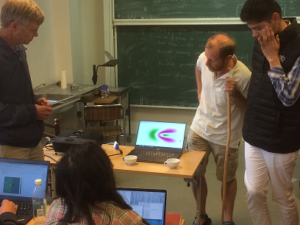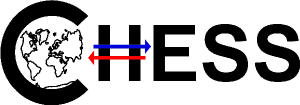 The Bornö Summer School in Oceanography took place from 30 July to 10 August, 2018, on the island of Storo Bornö, in the Gullmarn Fjord on the west coast of Sweden. The course was part-sponsored by CHESS but was also a collaboration with Stockholm University, University of Copenhagen, University of Hamburg and University of Oslo. Eleven students from Swedish, Danish, German and Norwegian institutions (but originally coming from lots of other countries) spent two weeks of their summer learning about ocean waves. Six lecturers (more or less three each week) and two cooks and handy men made the whole thing possible.
The Bornö Summer School in Oceanography took place from 30 July to 10 August, 2018, on the island of Storo Bornö, in the Gullmarn Fjord on the west coast of Sweden. The course was part-sponsored by CHESS but was also a collaboration with Stockholm University, University of Copenhagen, University of Hamburg and University of Oslo. Eleven students from Swedish, Danish, German and Norwegian institutions (but originally coming from lots of other countries) spent two weeks of their summer learning about ocean waves. Six lecturers (more or less three each week) and two cooks and handy men made the whole thing possible.
The course focused on long hydrostatic waves that can be described by the shallow water equations. In addition to a summary of wave kinematics, the course covered Poincaré and Kelvin waves, planetary and topographic Rossby waves as well as special lectures on tides and equatorial dynamics. The curriculum focused on linear waves (plenty to learn there!), but a lecture on nonlinear waves was added by popular demand. A key aspect of the course is that each day was split in two. Morning sessions consisted of lectures on the theory of waves while afternoon sessions were devoted to coding: the students had to code up their own shallow water models and use these to investigate the various wave phenomena discussed earlier. The participants unanimously voted the coding and testing as being the most rewarding part of the whole course. On the final Friday the students each presented a project based on their own favorite wave phenomenon.
The weather was beautiful, the water was warm and the food was great (perhaps breakfasts could have been more varied). The Bornö oceanographic research station is filled with tradition and physically isolated from the rest of the world. So both students and lecturers got a real chance to think those rare but important long thoughts on oceanography.
Text: Pål Erik Isachsen
Photos: Pål Erik Isachsen and Mika Malila
